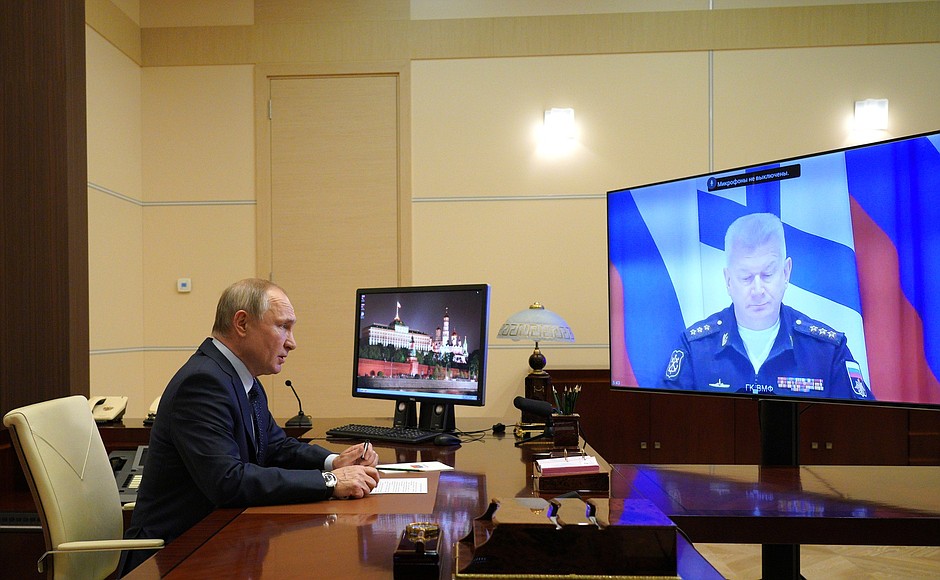
President of Russia Vladimir Putin: Mr Yevmenov, good afternoon.
Commander-in-Chief of the Navy Nikolai Yevmenov: Good afternoon, Comrade Supreme Commander-in-Chief of the Armed Forces of the Russian Federation!
Vladimir Putin: The Arctic expedition that you will report on is unprecedented in the history of both the Soviet period and the current history of the Russian Federation. Please give us this report.
Nikolai Yevmenov: Comrade Supreme Commander-in-Chief! The Umka-2021 comprehensive Arctic expedition has been held by the Chief Command of the Navy and has been ongoing since March 20, this month. A package of operational and training, and research and practical undertakings of different designations is being carried out under an integrated plan in the polar regions for the first time.
In all, the plan provides for 43 basic objectives. The expedition venue is Franz Josef Land archipelago, notably Alexandra Land and the adjacent ice-covered waters.
The average temperature there now is −25 to −30 degrees Celsius; the ice thickness is up to 1.5 metres, with winds up to 32 metres per second.
Over 600 military and civilian personnel are involved in the expedition, as well as about 200 pieces of military and special equipment and weapons.
At this point, 35 objectives have been fulfilled under the plan and eight are still being carried out in line with the plan.
The following tasks have been fulfilled for the first time in the history of the Navy: three atomic missile carriers arrived on schedule within a region with a radius of 300 metres after breaking through 1.5 metre thick ice under an integrated plan; two MiG-31s flew into the polar region including midair refueling, during which they passed over the geographical North Pole in two directions; and we practiced torpedo firing from a nuclear-powered submarine under the ice. After the training torpedo stopped beneath the ice, it was located with technical equipment and retrieved to the surface.
Also, an Arctic motorised rifle brigade unit conducted a tactical exercise in unfamiliar terrain in adverse weather conditions while it was detached from the main base.
As a result, the weapons, the military and special equipment proved out their technical specifications in the high latitudes and low temperatures. The exercises are being carried out as planned.
Comrade Supreme Commander-in-Chief of the Armed Forces of the Russian Federation, the practice of conducting integrated Arctic expeditions by the Navy will continue. Most importantly, finding new, even less explored territories will be the main objective of future expeditions.
This concludes my report.
Vladimir Putin: These combat training, research and practical measures have demonstrated the Russian Navy’s abilities and preparedness to operate in the harsh northern latitudes. The submarine, military transport aircraft and fighter aircraft crews, as well as Arctic motorised rifle units have shown improvements in combat training in the harsh Arctic environment. Our domestic weapons’ high combat capability and reliability in extreme weather conditions have been confirmed.
I want the Commander-in-Chief of the Navy to convey my words of gratitude to the personnel who participated in the expedition and the exercises, for their courage, dedication and professionalism.
The integrated Arctic expeditions, studies and exploration of the Far North in order to ensure Russia’s military security must be continued.
Thank you, Mr Yevmenov.
Nikolai Yevmenov: Yes, Comrade Supreme Commander-in-Chief! We will complete all the assignments.